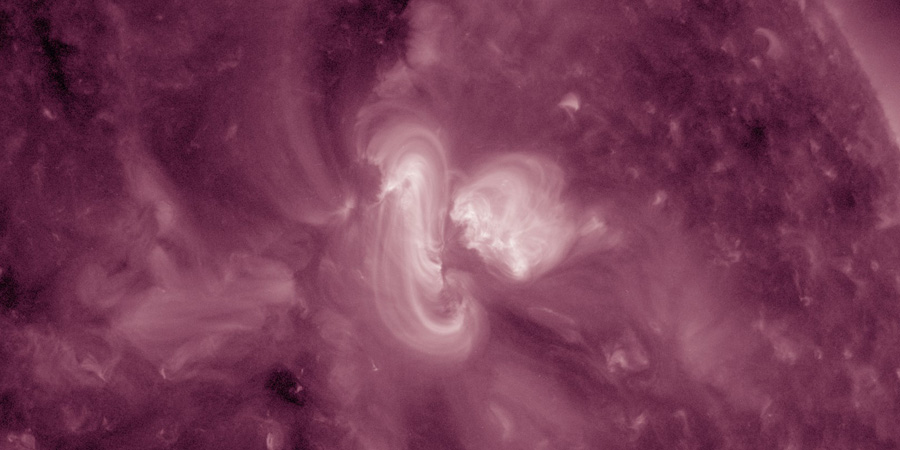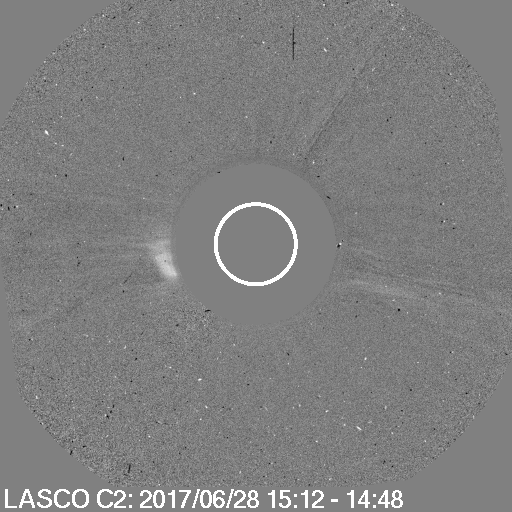Weak CME could give us a glancing blow
Thursday, 29 June 2017 23:13 UTC

Yes, a sign of life from your SpaceWeatherLive staff! It has been a very quiet space weather period the past few weeks with pretty much no geomagnetic or solar events worth mentioning. We did reach the minor G1 geomagnetic storm levels briefly 2 weeks ago but that was nothing too spectacular. Our Sun is even more quiet: its been almost 3 months ago since we last had an M-class solar flare and the last C-class solar flare was also a solid 3 weeks ago. Does that mean you are reading a news article without any news? Not exactly as a possibly interesting eruption took place yesterday that could give us some aurora in a few days from now.
Minor coronal dimming was observed yesterday afternoon near sunspot region 2664 which could be an indicator that some solar plasma was ejected into space. The eruption was related to a long duration B1 solar flare at the same time. Coronagraph imagery from SOHO/LASCO shows us a slow partial halo coronal mass ejection as you can see in the animation below.

⇧ The coronal mass ejection as captured by the SOHO/LASCO C2 coronagraph.
The plasma cloud is slow (at most 300km/s) and can be seen as a partial halo structure that reaches almost 180 degrees as seen on these SOHO/LASCO C2 images which sees the expanding plasma cloud from earth's point of view. Note that there is a second coronal mass ejection heading towards the east. This is from an unrelated event and should be ignored.
Our conclusion is that this plasma cloud could arrive as a glancing blow at Earth on July 2nd or 3rd due to the relatively favourable earth-directed position of the eruption and the near 180 degrees partial halo outline. Geomagnetic storming is not expected as the plasma cloud is too slow and likely will not impact us head on but it could be an interesting event to keep an eye on for high latitude sky watchers that aren't plagued by the midnight sun.
Thank you for reading this article! Did you have any trouble with the technical terms used in this article? Our help section is the place to be where you can find in-depth articles, a FAQ and a list with common abbreviations. Still puzzled? Just post on our forum where we will help you the best we can!
Latest news
Latest forum messages
More topicsSupport SpaceWeatherLive.com!
A lot of people come to SpaceWeatherLive to follow the Solar activity or if there is a chance to see the aurora, but with more traffic comes higher costs to keep the servers online. If you like SpaceWeatherLive and want to support the project you can choose a subscription for an ad-free site or consider a donation. With your help we can keep SpaceWeatherLive online!
Space weather facts
| Last X-flare | 2025/12/08 | X1.1 |
| Last M-flare | 2025/12/31 | M7.11 |
| Last geomagnetic storm | 2026/01/02 | Kp5 (G1) |
| Spotless days | |
|---|---|
| Last spotless day | 2022/06/08 |
| Monthly mean Sunspot Number | |
|---|---|
| December 2025 | 124 +32.2 |
| January 2026 | 113.6 -10.4 |
| Last 30 days | 107.6 -0.4 |





